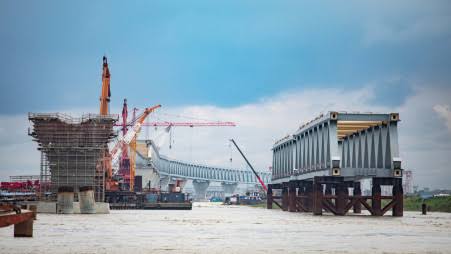SAMI
Published:2020-08-18 16:49:56 BdST
Uncertainty grips Padma Bridge work for erosion, Covid-19
River erosion and the ongoing coronavirus pandemic have made work on the long-awaited Padma bridge uncertain for an indefinite period, sources said.
The project office predicts that the June 2021 deadline for completion of the country's longest bridge will not be possible to meet, they added.
But the authorities have not yet confirmed how long it would take to finish the task as uncertainty looms large over the pandemic and river erosion.
"It's hard to complete the bridge by next June," said project director Shafiqul Islam.
According to a progress report, the Padma Multipurpose Bridge Project (PMBP) lagged behind the monthly scheduled work since January by 3.0-4.0 percent.
Until July 2020, it recorded progress in main bridge work by 87.5 percent and river training work by 74 percent.
The project office has overcome its initial crisis centring Covid-19 with the arrival of the Chinese workers under the main bridge and river training by April and May.
But official sources said 35 percent of the foreign staff in both main bridge and river training contracts are yet to join, thus making the progress affected.
The project faced the first blow after the Covid-19 outbreak in Wuhan, China, at the end of December where most of the Chinese team went to celebrate new year.
For which, progress in the first three months was almost nil with only placing some steel-truss spans.
But progress in the construction work was slow after June with the rise of floodwater in the river. It later faced a severe blow on July 31 when sudden erosion took away more than 125 roadway slabs and 192 railway stringers.
Those were kept ready to be placed on the bridge's visible part as part of second-phase work on the preparation of road and railway paths.
Bridges secretary Mohammad Belayet Hossain said the Chinese contractor has already ordered the full set of lost railway items from Luxembourg.
Before their arrival by December, the contractor will try to recover the devoured items in an effort to resume the bridgework.
But the contractor also lost camps, storage foundations, beams, steel structures, bolts, warehouse laboratories, cranes and generators in the erosion.
However, it has rescheduled span installation work for December from July due to a rise in river water.
The contractor has completed installation of 31 out of 41 spans, making 4.9 kilometre of the total 6.15-kilometre rail-cum-road bridge visible.
Meanwhile, sources said the erosion recovery plan submitted by the contractor to the project office could not be worked out due to continued rise in river water and scouring.
Mr Islam said behaviour of the Padma is very unpredictable and difficult to assume earlier. "We must do work now, but how could it be done when any boat or barge cannot be anchored?"
The contractor will have to do many things for the protection of yards which they cannot do now, the project director said.
Sources said the project often faces challenges, thus making the work difficult to finish in time.
Meanwhile, a conflict is likely to arise over a plan placed by Water Development Board (WDB) to protect the river from erosion within the project area. But the plan placed by the WDB was rejected by the Chinese company as it would be hard to recover the lost items with its implementation.
An international contract expert said this kind of move may create a long-term problem due to creating scope for violation of international law.
It was learnt that WDB chairman and other senior officials, including principal secretary and cabinet secretary, rushed to project sites soon after erosion on July 31.
They instructed the authorities to take immediate steps to protect the construction site as Padma bridge is the government's topmost priority project.
The WDB later submitted the plan to place geo bags on the construction yard side.
Mr Islam, however, expressed his ignorance about the WDB plan but said the Chinese contractor is responsible for doing all sorts of work, including protection of the construction yard.
The Bangladesh Bridges Authority has been executing the mega scheme at a cost of Tk 301.93 billion.
The project work began in 2014 with main bridgework being done by China Railway Major Bridge Engineering Group and river training by Sinohydro Corporation.
The firms started work on November 26 and December 31 in 2014 respectively.
Unauthorized use or reproduction of The Finance Today content for commercial purposes is strictly prohibited.


